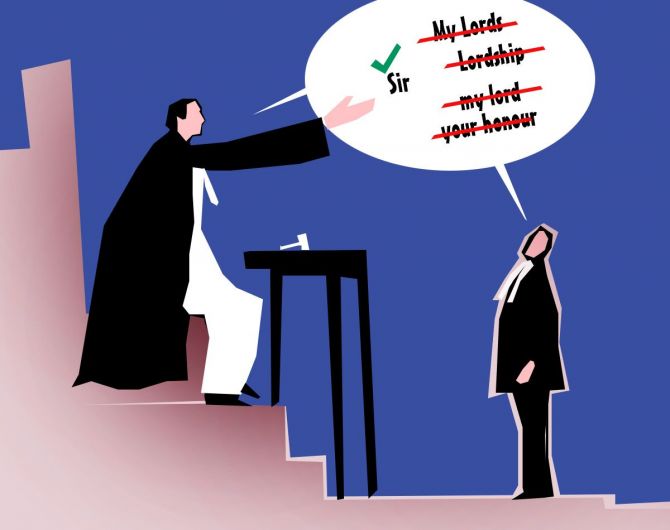'Lawyers don't know if a particular judge would like being addressed as 'Sir', and thus the colonial terms are 'safe' to use.'

'How many times will you say 'My Lords'? If you stop saying this, then I will give you half of my salary,' Justice P S Narasimha of the Supreme Court recently told a lawyer during a hearing.
'Why don't you use 'Sir', instead?'
The law does not prescribe the use of the word 'Lordship', 'My Lord' or 'Your Honour'. "It's a colonial hangover which continues till date," says Sameer Jain, managing partner, PSL Advocates and Solicitor.
The term 'Lords' is borrowed from the English nobility, which were addressed as 'Lords' and 'Ladies'.
Back in the day, judges came from nobility and ended up being addressed similarly.
In India, colonial culture has been interwoven in the social as well as administrative fabric for the longest time.
During the pre-Independence era, the courts were only held by the Englishmen who were deputed in the colonies, thereby retaining their titles of Lords.
"Therefore, the honorific of 'My Lords' and 'Your Lordships' comes from the age-old practice of addressing the judges as Lords," says Ekta Rai, advocate, Delhi high court.
The Bar Council of India's rules do not mandate calling judges as My Lords or Lordship.
In February 2023, while dismissing a public interest litigation filed by an advocate seeking removal of the honorific, the Supreme Court observed that judges should be addressed in courts in a respectful and dignified manner and it is not compulsory to call them 'My Lord', 'Your Lordship' or 'Your Honour'.
However, the court held that the plea of the advocate seeking a ban on the use of these terms and directing the courts that the judges should not be addressed in such a traditional manner could not be accepted.
But some issues go beyond the letter of the law.
"For lawyers it's mostly a conversational hitch, that is, they are just conversationally more comfortable in using that term. Also, they do not know if a particular judge would like being addressed as 'Sir', and thus the colonial terms are 'safe' to use," Jain says.
There have been several instances where judges have acknowledged this practice as feudal and not discouraged anyone from using the term 'Sir'.
"Addressing the judges as 'Sir' does not warrant any penal actions for lawyers, nor is there any law or mandate specifying the compulsive use of the feudal term to address the court, to the best of my knowledge," Rai says.
Gujarat High Court Chief Justice Sonia Gokani had in February observed that a judge should be addressed as 'Sir', irrespective of the gender.
Chapter IIIA on 'To address the Court' to Part VI of the Bar Council of India's rules, which was added in 2006, says, 'Consistent with the obligation of the Bar to show a respectful attitude towards the court and bearing in mind the dignity of Judicial Office, the form of address to be adopted whether in the Supreme Court, High Courts or Subordinate Courts should be as follows: 'Your Honour' or 'Hon'ble Court' in Supreme Court & High Courts and in the Subordinate Courts and Tribunals it is open to the Lawyers to address the Court as 'Sir' or the equivalent word in respective regional languages.'
The rules further explained, 'As the words 'My Lord' and 'Your Lordship' are relics of the Colonial past, it is proposed to incorporate the above rule showing respectful attitude to the Court.'
In 2021, Chief Justice of India S A Bobde objected to being called 'Your Honour'.
'When you call us 'Your Honour', you either have the Supreme Court of the United States or the magistrate in mind. We are neither,' Justice Bobde had said.
A PIL in 2014 asked that the use of archaic expressions be stopped. Justices H L Dattu and Bobde had rejected the petition saying that the terms 'My Lord' and 'Your Lordship' had never been compulsory.
This year, Chief Justice of India Dr D Y Chandrachud also lauded the use of 'Sir' when a lawyer addressed him.
"The Supreme Court, in a 2014 case, left the choice to lawyers, emphasising respect and dignity. This shift reflects evolving societal values towards equality, respect, and democratic principles in the legal system," said Sonam Chandwani, managing partner of KS Legal and Associates.
In the United Kingdom (England and Wales), judges of the supreme court are addressed as 'My Lord' or 'Lady' and judges of the high court and court of appeal are addressed as 'My Lord' or 'Lady' and referred to as 'Your Lordship' or 'Ladyship'.
In many states in the US, a judge is addressed as 'Your Honour' or 'Judge'.
Feature Presentation: Aslam Hunani/Rediff.com











